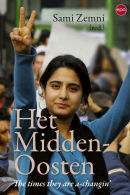Consideras esto importante? Por favor apóyanos.
(27-05-2013) Why Maliki Must Go
(17-05-2013) Sectarianism in Iraq stoked by Syrian war
(16-05-2013) Baghdad market attacks, shootings in north kill 17
(15-04-2013) Nueva presentación del cómic Casa Bábili
(11-04-2013) Conference on the Invasion of Iraq opens with Eyewitness Accounts, Dr. Azmi Bishara: The ...
(11-04-2013) Opening Remarks at the Center's Conference on the Invasion of Iraq by Dr Azmi Bishara: ...
The BRussells Tribunal is independent and wants to remain independent.
The BRussells Tribunal is an activist think tank and peace organisation with a special focus on Iraq. Read more...



 The times they are a-changin' is het eerste grondige Nederlandstalig overzicht dat voorbij oppervlakkigheden en algemeenheden wandelt, en ook nog eens de hele regio bestrijkt, van Egypte en Tunesië tot Marokko, Libië, Syrië, Libanon, Palestina, Jemen, Jordanië, Irak, Bahrein en Israël. Daar bestaat een woord voor: een standaardwerk.
The times they are a-changin' is het eerste grondige Nederlandstalig overzicht dat voorbij oppervlakkigheden en algemeenheden wandelt, en ook nog eens de hele regio bestrijkt, van Egypte en Tunesië tot Marokko, Libië, Syrië, Libanon, Palestina, Jemen, Jordanië, Irak, Bahrein en Israël. Daar bestaat een woord voor: een standaardwerk.